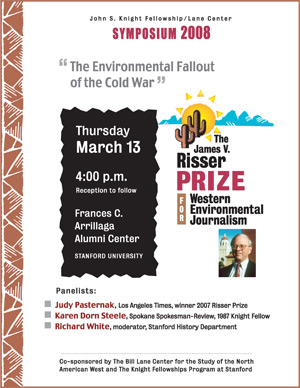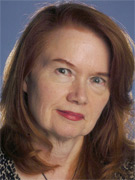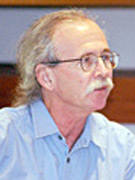
The Bill Lane Center for the American West, Stanford University

2008 Risser Prize Symposium
Symposium on Cold War Environment Issues to be Held at Stanford
Related Media
- Symposium Audio (available on Stanford iTunes)
A panel of award-winning journalists will gather at Stanford this month in a symposium to discuss the Cold War's impact on the Western environment.
The symposium will be presented in conjunction with the 2007 James V. Risser Prize for Western Environmental Journalism. Judy Pasternak of the Los Angeles Times, won the prize and will participate in the symposium.
The symposium is titled, "Environmental Fallout of the Cold War." Pasternak won the Risser Prize for her series, "Blighted Homeland," which revealed how the U.S. government took uranium from Navajo land to build its nuclear arsenal during the Cold War and then abandoned the Navajo people when they began to die.
Pasternak will be joined by Karen Dorn Steele, of the Spokane Spokesman-Review, who has won numerous awards for her coverage of nuclear issues in the West. Stanford History Prof. Richard White will be the moderator.
The symposium will begin at 4 p.m. Thursday, March 13 in the Arrillaga Alumni Center. It is open to the public, and will be followed by a reception.
The prize is named for Risser, a two-time Pulitzer Prize winner and director emeritus of the Knight Fellowships program. It is sponsored by the John S. Knight Fellowships for Professional Journalists and the Bill Lane Center for the Study of the North American West at Stanford.
Pasternak's four-part series, published in November 2006, was the result of two years of reporting about how the mining of uranium had left behind wastes that sickened generations of Navajos on Navajo Nation land in Arizona, New Mexico and Utah. One of the judges characterized the series as "great writing, great history and investigative work; overall, a great story that hasn't been told."

Judy Pasternak |

Karen Dorn Steele | 
Richard White |
Pasternak has worked for the Los Angeles Times for 23 years. In recent years her work has been honored by the Overseas Press Club, the James Aronson Award for Social Justice Journalism and the Goldsmith Award for Investigative Reporting.
Dorn Steele, a Knight Fellow at Stanford in the 1980s, has won numerous national awards, including a William Stokes Award for reporting on secret radiation releases from the Hanford nuclear reservation and a Best of the West award for breaking the story of a congressionally mandated but long-delayed National Cancer Institute study on nuclear fallout from Cold War bomb tests.
White is the Margaret Byrne Professor of American History at Stanford. He is widely regarded as one of the nation's leading scholars in three related fields: the American West, Native American history and environmental history. Professor White came to Stanford in 1998 and is the author of five books, including "The Middle Ground: Indians, Empires and Republic in the Great Lakes Region, 1650-1815," which was named a finalist for the 1992 Pulitzer Prize.
The Risser Prize was established in 2005 and is open to print, broadcast and online journalists writing about environmental issues in western Canada, Mexico and the United States. The prize was established in recognition of Risser's outstanding journalism career and his leadership of the John S. Knight Fellowships for Professional Journalists from 1985 until his retirement in 2000.
The Knight Fellowships program annually brings 12 outstanding mid-career U.S. journalists and as many as eight from other countries to study at Stanford in a one-year program. More than 700 journalists have studied at Stanford under the program since it began in 1966. James Bettinger is director of the program. Dawn E. Garcia is deputy director.
The Bill Lane Center for the Study of the North American West was established at Stanford in 2002. In 2005 it was endowed by L. W. "Bill" Lane Jr., Stanford, '42. The Bill Lane Center is an interdisciplinary institute dedicated to promoting understanding of the North American West's distinctive regional identity and enriching the region's social, economic, environmental, political, and cultural vitality. Through research programs, teaching, public events and conferences, the center brings together scholars, journalists, public and private sector leaders, and public intellectuals to address the central issues shaping the past, present and future of the West- from Canada to Mexico, from the Great Plains to the Pacific Rim. Stanford history Professors David M. Kennedy and Richard White are directors of the program, and Tammy Frisby is executive director.
Knight-Risser Prize Symposiums:
“When the Well Runs Dry: Confronting a Groundwater Crisis” 

January 2017 Knight-Risser Prize Symposium, January 25, 2017
“Breathless in Texas: Energy Production Puts Air at Risk” 

2016 Knight-Risser Prize Symposium, February 17, 2016
“Troubled Waters: Marine Life and the Threat of Ocean Acidification” 

2015 Knight-Risser Prize Symposium, February 25, 2015
“Deadly Measures: Uncovering a Little-Known Agency's Toll on Wildlife” 

2014 Knight-Risser Prize Symposium, February 5, 2014
“Wildlife, Wired: How Technology Is Changing Nature Reporting” 

2013 Knight-Risser Prize Symposium, February 20, 2013
“Adapting to Dry Times: The Role of the Media in an Increasingly Arid West ” 

2012 Knight-Risser Prize Symposium, January 25, 2012
“The Crisis in Western Environmental Journalism” 
November 2010 Knight-Risser Prize Symposium, November 17, 2010
“Visualizing the Environment” 
January 2010 Risser Prize Symposium, January 27, 2010
“Climate Change Hits Home”
December 2008 Risser Prize Symposium, December 3, 2008
“Environmental Fallout of the Cold War” 
March 2008 Risser Prize Symposium, March 13, 2008
“Water in the West: 21st Century Challenges in a 19th Century Legal Framework” 
2005 Risser Prize Symposium, November 1, 2005
Pasternak's four-part series, published in November 2006, was the result of two years of reporting about how the mining of uranium had left behind wastes that sickened generations of Navajos on Navajo Nation land in Arizona, New Mexico and Utah. One of the judges characterized the series as "great writing, great history and investigative work; overall, a great story that hasn't been told."
Texas Tribune, ProPublica

The Desert Sun and USA Today

CPI, InsideClimate News, The Weather Channel

The Seattle Times

The Sacramento Bee

High Country News

5280 Magazine

Seattle Post-Intelligencer

What Went Wrong?
The Seattle Times

San Antonio Express-News

The Los Angeles Times

High Country News



